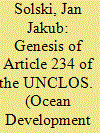| Srl | Item |
| 1 |
ID:
178620


|
|
|
|
|
| Summary/Abstract |
Adjacency, notwithstanding its status as a basis for generating maritime entitlements, has no place as a principle under the existing law of the sea. To endow it with such status in the negotiation of an agreement for the conservation and sustainable use of marine biological diversity in areas beyond national jurisdiction (BBNJ) is likely to upset the delicate balance between the rights of coastal states and those of the international community, which is essential to the widespread acceptance of United Nations Convention on the Law of the Sea (UNCLOS). This article argues that the access regime for marine genetic resources (MGRs) straddling the boundary between areas beyond national jurisdiction (ABNJ) and areas within national jurisdiction (AWNJ) should be location based, and adjacent coastal states should not be accorded preferential rights in the distribution of benefits. However, due regard should be paid to the rights and legitimate interests of adjacent coastal states when transboundary impacts may result from measures adopted for and activities conducted in ABNJ, including those that directly affect MGRs straddling the boundary between ABNJ and AWNJ. At the procedural level, coastal states should be allowed to participate, primarily through prior notification and consultation, in the adoption of area-based management tools (ABMTs) in ABNJ and the conduct of environmental impact assessment (EIA) with respect to activities therein.
|
|
|
|
|
|
|
|
|
|
|
|
|
|
|
|
| 2 |
ID:
178619


|
|
|
|
|
| Summary/Abstract |
The obligations of state sponsorship in the exploration and exploitation of the resources in the international seabed area require states parties to the 1982 United Nations Convention on the Law of the Sea (UNCLOS) to control the exploration and exploitation activities of contractors through domestic legislation and the adoption of relevant administrative measures, and to ensure that contractors comply with UNCLOS and international regulations, rules, and procedures promulgated by the International Seabed Authority. The Law of the People's Republic of China on the Exploration and Exploitation of Resources in the Deep Seabed Area (DSM Law) was adopted on 26 February 2016. It is the first important legislative step that China has taken to fulfill its obligation as a sponsoring state. Given the fact that a number of the provisions in China’s DSM Law are phrased in rather general terms, the next step that China should take is to develop a comprehensive domestic legal regime for deep seabed mining under the DSM Law. Part I of this article provides an overview of China’s developing domestic legal regime for deep seabed mining. Part II proposes three principles that should be enshrined in China’s developing domestic legal regime for deep seabed mining, and Part III articulates the legal norms that underpin China’s developing domestic legal regime for deep seabed mining. Part IV delivers a critical review of current normative instruments issued under the DSM Law and proposes suggestions to revise one particular instrument, the Permit Measures, as adopted under the DSM Law.
|
|
|
|
|
|
|
|
|
|
|
|
|
|
|
|
| 3 |
ID:
178618


|
|
|
|
|
| Summary/Abstract |
Article 234 is exceptional regarding its wording and placement in the United Nations Convention on the Law of the Sea (UNCLOS), as well as in its historical background. The Arctic provision has given rise to divergent interpretations regarding the conditions for invoking it, the limitations on the authority under Article 234, and its spatial scope of application. It has served as a justification for specific legislation adopted by Canada and Russia that has been opposed by the United States. The article, describes as a “textbook example of finding a compromise in international treaty negotiations,” was negotiated directly and privately, among these three states during the Third United Nations Conference on the Law of the Sea (UNCLOS III). This article describes the historical background to Article 234 and sheds new light on the negotiating process that led to the adoption of the provision.
|
|
|
|
|
|
|
|
|
|
|
|
|
|
|
|
| 4 |
ID:
178621


|
|
|
|
|
| Summary/Abstract |
This study explores the passage regimes of the Kerch Strait and its adjacent maritime areas in the context of current arbitration proceedings between Ukraine and the Russian Federation. It ascertains that conflicting sovereignty claims over Crimea might lead to strait states and user states alike retaining their different approaches to the passage regime of the Kerch Strait. Thus, the regimes of transit passage and authorization-based passage might simultaneously be applied to the Kerch Strait under the domestic laws of the strait states, law of the sea, and general international law, particularly the obligation of nonrecognition. The law of the sea allows the reconciliation of such conflicting approaches and ensures legal certainty in the shipping lanes of the Kerch Strait if the coastal states agree on and respect a sui generis passage regime.
|
|
|
|
|
|
|
|
|
|
|
|
|
|
|
|